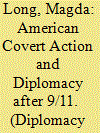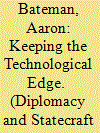|
|
|
Sort Order |
|
|
|
Items / Page
|
|
|
|
|
|
|
| Srl | Item |
| 1 |
ID:
188628


|
|
|
|
|
| Summary/Abstract |
Ronald Reagan entered the White House in 1981 as the president who promised to confront the foreign enemies of the United States. Whilst the Soviet Union remained the single greatest threat to the United States, the 1979 hostage crisis in Iran dramatically raised concerns over international terrorism. Reagan’s approach to this threat was unequivocal – those responsible would be subject to “swift and effective retribution”. In 1983, one of the most devastating acts of international terrorism in American history confronted Reagan – the bombing of the Marine barracks in Lebanon. Despite Reagan’s earlier pledge, those believed to have been responsible for this attack – Iran and its surrogate, Hezbollah – avoided punishment. This analysis explains the discrepancy between Reagan’s rhetoric and his actions by examining how strategic imperatives related to the Cold War helped deter a military reprisal against both Iran and Hezbollah.
|
|
|
|
|
|
|
|
|
|
|
|
|
|
|
|
| 2 |
ID:
188630


|
|
|
|
|
| Summary/Abstract |
The relationship between American diplomats and intelligence officers has always been complex. The focus of American foreign policy and national security on counterterrorism efforts in the aftermath of the 9/11 terrorist attacks further shaped the dynamic between diplomats and intelligence officers in the field as well as their respective roles. The tension between diplomacy and covert action as policy-implementing tools was largely resolved to the benefit of the latter. Consequently, a new status quo emerged. Intelligence officers took a leading role in policy-implementation efforts through covert action, whilst the role of diplomats in the field evolved in line with counterterrorism-driven foreign policy and national security needs. This analysis introduces a new typology of diplomats in the twenty-first century, contrasting the multifaceted diplomatic activists, who advanced counterterrorism-driven diplomacy, against the traditionalists seeing this new diplomacy as bellicose and against American national interests.
|
|
|
|
|
|
|
|
|
|
|
|
|
|
|
|
| 3 |
ID:
188625


|
|
|
|
|
| Summary/Abstract |
In January 1964, the University of Witwatersrand, Johannesburg, appointed Robert Birley, former headmaster of Eton College, as a visiting professor. This analysis examines how Birley used this role, and his relatively secure position as a high-profile British figure, to speak out against the apartheid state. His professorship took place during a time of strained Anglo-South African relations; having become a republic and left the Commonwealth in 1961, South Africa appeared to be slipping ever further from the ‘British world’. To combat this course, London attempted to use cultural diplomacy, particularly in the form of academic and educational exchanges, to imbue future leaders with a more positive view of Britain. This analysis demonstrates that whilst Birley’s professorship was independent from this policy, he was in regular contact with British officials, and his actions correlated with their aims.
|
|
|
|
|
|
|
|
|
|
|
|
|
|
|
|
| 4 |
ID:
188624


|
|
|
|
|
| Summary/Abstract |
Agnes Smedley is one of the more fascinating figures in the history of Sino-American relations. Albeit once the subject of two excellent biographies, and alternately celebrated and reviled in the United States, she nevertheless remains a relatively obscure figure. As the Sino-American relationship now occupies a crucial place in international politics, it is worthwhile to revisit the career of this ardent feminist and political pilgrim. Amidst the maelstrom of revolution and Sino-Japanese war, she professed faith in a better future. Both her perspicacity and illusions were striking, as she sought to discern – and explain to Americans – the churning reality of her preferred homeland, China. Questions confronting Smedley still linger in the twenty-first century as Beijing and Washington try to accommodate each other’s ambitions and rival conceptions of human society.
|
|
|
|
|
|
|
|
|
|
|
|
|
|
|
|
| 5 |
ID:
188623


|
|
|
|
|
| Summary/Abstract |
This analysis considers some of the methods and purposes of gathering intelligence in sixteenth-century diplomacy. Regular despatches from ambassadors provided a steady stream of information, but of particular importance was the development of the formal relation, the relazione, pioneered in Venice and subsequently imitated elsewhere. Two imitations by English authors – Robert Beale and Daniel Rogers – are evaluated, one with a critical relationship to the evolution of an emerging genre of advice literature on travel, the ars apodemica. By the close of the century, the aspects to which the private traveller was to direct their attention mirrored the information to be contained in relazioni for the purposes of the state.
|
|
|
|
|
|
|
|
|
|
|
|
|
|
|
|
| 6 |
ID:
188626


|
|
|
|
|
| Summary/Abstract |
It is widely thought that Japan’s involvement in multilateral conflict-resolution diplomacy began at the 1989 Paris international peace conference aimed at ending hostilities in Cambodia. However, in 1970, Japan was engaged in the Jakarta conference, a gathering of Asian and Pacific countries attempting to resolve a Cambodian conflict that erupted in that year and in the follow-up initiatives. This analysis draws on declassified diplomatic documents to show that although those efforts failed, Tokyo gained much from its debut in an international effort to resolve a conflict in Asia: expansion of its regional role, co-operation with Southeast Asian countries, and valuable peacemaking experience. This examination of that history elucidates the features and limitations of Japanese peacemaking diplomacy and examines international reactions to those efforts and the manner in which that experience shaped Japan’s role in Southeast Asia.
|
|
|
|
|
|
|
|
|
|
|
|
|
|
|
|
| 7 |
ID:
188629


|
|
|
|
|
| Summary/Abstract |
In March 1983, President Ronald Reagan established the Strategic Defence Initiative [SDI], a research effort to develop the technologies for land- and space-based missile defence. This programme quickly unleashed anxieties about an arms race in space. Superpower military space activities were of significant concern to Britain because they had direct bearing on two key areas of its national security: space-based intelligence collection and the credibility of its nuclear deterrent. This analysis argues that the uses of space for military and intelligence purposes was an essential, though often invisible, aspect of the Anglo-American relationship during the Cold War. Despite the opposition of her senior advisors to SDI, British Prime Minister Margaret Thatcher maintained that the programme was necessary to stay ahead of the Soviet Union in an intensifying high-technology competition. Rather than opposing the expanded militarisation of space, she believed it required careful management to further British national security interests.
|
|
|
|
|
|
|
|
|
|
|
|
|
|
|
|
| 8 |
ID:
188627


|
|
|
|
|
| Summary/Abstract |
Scholars have long debated when the Palestinian Liberation Organisation [PLO] first accepted the international consensus on a two-state settlement as a resolution to the Israel-Palestine conflict. This analysis contributes to the debate by closely examining PLO diplomatic support for a draft United Nations [UN] Security Council resolution along the lines of the two-state consensus in January 1976, its passage prevented by an American veto. Drawing upon declassified documents in American, UN, and British archives, this analysis argues that the record of negotiations at the Security Council strongly indicates that by the mid-1970s, the PLO was ready to accept the terms of a two-state settlement, even as the United States and Israel persistently rejected a negotiated settlement inclusive of Palestinian self-determination.
|
|
|
|
|
|
|
|
|
|
|
|
|
|
|
|
|
|
|
|
|